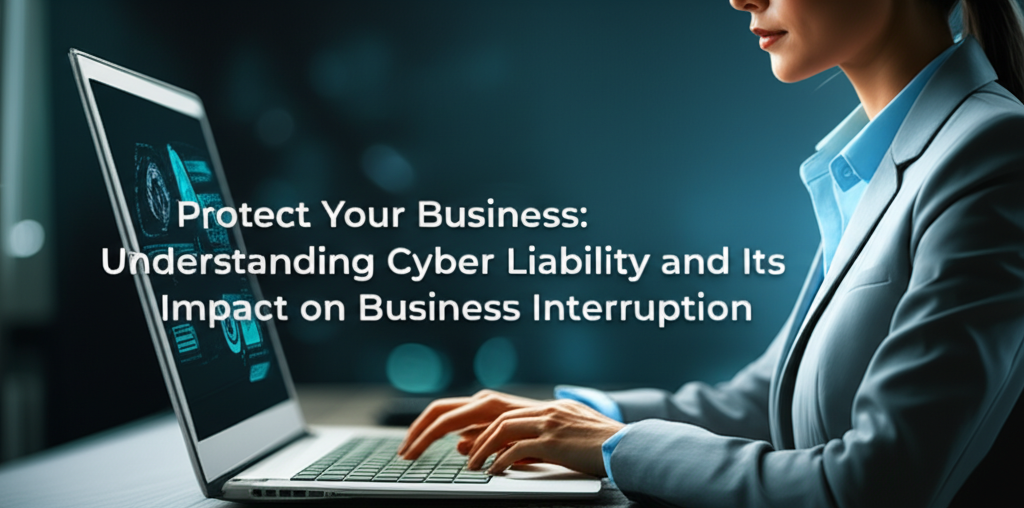In today’s digital age, protecting your business from cyber threats isn’t just a luxury; it’s a necessity. Cyber attacks are on the rise, with companies of all sizes facing potential disruptions that can lead to significant financial losses. Have you ever wondered what would happen if your business fell victim to a cyber attack? How would it affect your operations, your employees, and most importantly, your bottom line? This article is designed to help you navigate the complex world of cyber liability and understand its profound impact on business interruption.
Throughout this piece, we’ll explore the essentials of cyber liability, the key components that make up a robust cyber insurance policy, and the tangible benefits it provides. By the end, you will not only grasp the importance of cyber liability insurance but also feel empowered to take proactive steps to safeguard your business against the ever-evolving cyber threat landscape. So, let’s dive in and uncover how you can protect your business and ensure continuity, even in the face of adversity.
Understanding Cyber Liability
Cyber liability refers to the financial and legal responsibilities a business faces in the event of a cyber incident, such as a data breach or cyber attack. These incidents can lead to the exposure of sensitive information, financial losses, and reputational damage. To illustrate, let’s consider a scenario:
Imagine a retail company that suffers a data breach, exposing the personal information of thousands of customers. The fallout includes not only the costs associated with notifying affected customers but also potential lawsuits, regulatory fines, and loss of customer trust. This is where cyber liability insurance comes into play, offering protection against these risks.
The Growing Importance of Cyber Liability
As technology continues to advance, the threat landscape evolves. According to a report by Cybersecurity Ventures, cybercrime costs are projected to reach $10.5 trillion annually by 2025. This staggering figure underscores the need for businesses to take cyber liability seriously. Not only does it protect against financial losses, but it also provides peace of mind knowing that you have a safety net in place.
Key Components of Cyber Liability Insurance
When considering cyber liability insurance, it’s essential to understand its key components. Policies can vary significantly, but most will include the following elements:
1. Data Breach Coverage
This coverage assists in managing the costs associated with a data breach, including:
- Notification costs to inform affected individuals
- Credit monitoring services for those impacted
- Legal fees related to lawsuits or regulatory investigations
2. Business Interruption Coverage
Business interruption coverage compensates for lost income during the period your business is unable to operate due to a cyber incident. This can be invaluable for maintaining financial stability in the aftermath of a cyber attack.
3. Cyber Extortion Coverage
Cyber extortion coverage protects against ransomware attacks. If your business is targeted and data is held hostage, this coverage can help you pay the ransom and recover your data.
4. Network Security Liability
This aspect of cyber liability insurance protects against claims arising from failures in your network security, such as unauthorized access to customer data or malware infections.
5. Media Liability
If your business produces content, media liability coverage protects against claims of copyright infringement, defamation, or invasion of privacy.
Benefits and Importance
Investing in cyber liability insurance offers several benefits that can significantly impact your business’s resilience and recovery capabilities. Here are some key reasons why it’s crucial:
1. Financial Protection
Cyber incidents can lead to substantial financial losses. With cyber liability insurance, you can mitigate these costs, helping your business recover more quickly.
2. Legal Compliance
Many industries are subject to regulations that mandate data protection measures. Cyber liability insurance can help ensure compliance and protect against the associated penalties.
3. Enhanced Reputation
Having cyber liability insurance demonstrates to your customers and partners that you take data protection seriously. This can enhance your reputation and build trust.
4. Access to Expert Resources
Many insurance providers offer access to cybersecurity experts who can help you develop robust security protocols and response strategies, making your business more resilient against attacks.
Practical Applications
Now that we’ve covered the basics, let’s explore how you can apply this knowledge to your business. Here are some actionable steps:
1. Assess Your Cyber Risk
Start by identifying the types of data your business handles and the potential risks associated with it. This could include customer information, financial records, and proprietary data. Understanding your risk profile is the first step in choosing the right coverage.
2. Consult with a Cyber Insurance Broker
A knowledgeable broker can help you navigate the complex landscape of cyber liability insurance. They can assist in tailoring a policy that meets your specific needs and provides adequate coverage for your business.
3. Implement Robust Cybersecurity Measures
Insurance is just one part of the equation. Invest in cybersecurity measures such as firewalls, encryption, and employee training to minimize your risk of a cyber incident. This proactive approach not only protects your data but can also lower your insurance premiums.
4. Create an Incident Response Plan
Having a well-defined incident response plan can make a significant difference in how quickly your business recovers from a cyber attack. This plan should outline roles and responsibilities, communication strategies, and steps to contain and mitigate the incident.
Frequently Asked Questions
What is cyber liability insurance?
Cyber liability insurance is a specialized form of insurance that protects businesses from financial losses resulting from data breaches, cyber attacks, and other cyber-related incidents. It covers costs associated with data recovery, notification of affected individuals, legal fees, and potential regulatory fines.
How does cyber liability affect business interruption?
Cyber liability insurance, particularly business interruption coverage, compensates businesses for lost income during the period in which they cannot operate due to a cyber incident. This ensures that your business can continue to meet its financial obligations and maintain stability even after an attack.
Is cyber liability insurance necessary for all businesses?
While not legally required, cyber liability insurance is highly recommended for any business that handles sensitive information. With cyber threats increasing, having this coverage can provide essential financial protection and peace of mind.
What should I look for when choosing a cyber liability insurance policy?
When selecting a policy, consider factors such as coverage limits, exclusions, deductibles, and the specific risks your business faces. It’s also important to review the insurer’s reputation and their claims-handling process to ensure they will support you in the event of a cyber incident.
How can I reduce my cyber risk?
To reduce your cyber risk, implement strong cybersecurity measures such as regular software updates, employee training, data encryption, and secure backup solutions. Additionally, conducting regular risk assessments can help identify vulnerabilities and improve your overall security posture.
Conclusion
In conclusion, understanding cyber liability and its impact on business interruption is crucial for any business operating in today’s digital landscape. The potential risks are real, and the consequences of a cyber incident can be devastating. By investing in cyber liability insurance and implementing robust cybersecurity measures, you are not only protecting your business but also ensuring its longevity and success.
As you reflect on the information presented here, consider taking proactive steps to safeguard your business today. Whether it’s consulting with an insurance broker, enhancing your cybersecurity protocols, or developing a solid incident response plan, every action you take can make a significant difference. Remember, it’s not if a cyber attack will happen, but when. Equip your business to handle these challenges, and you’ll set yourself up for long-term success. If you have any questions or need further guidance, feel free to reach out. Let’s protect your business together!


